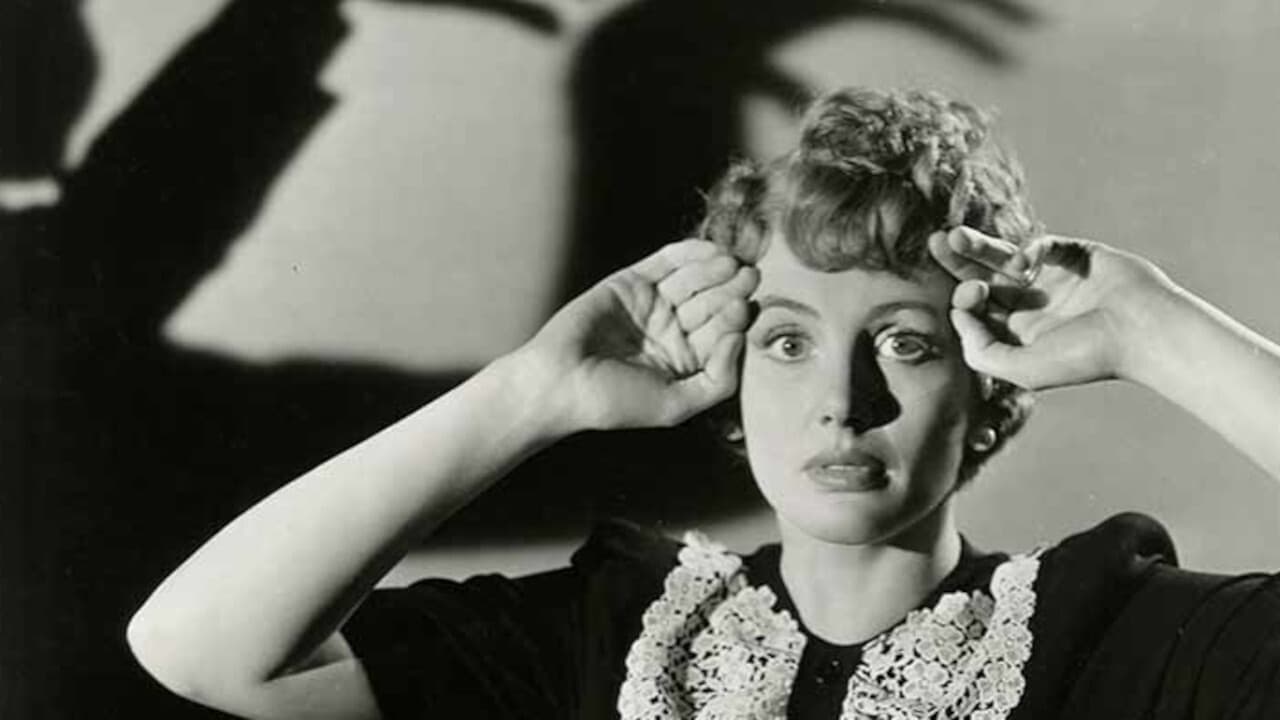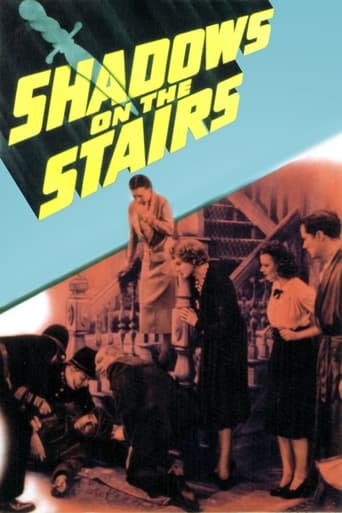

Watchable mystery comedy, in a good-looking lodging house; this is a peculiar comedy, because it doesn't treat gruesome events (murders, betrayal) as occasions for humor, but shows the unnervingly humorous side of some dramatic situations, it depends on the grotesque side of unnerving situations (more like in Poe and much 19th century chilling humor). Frieda Inescort makes a convincing matron, vulgar and likable, aware of her appeal; except for the youngsters, the portrayals aren't very flattering, the relations are sour (the Indian and the maid, Mrs. Armitage and the maid, the crook and the maid), but vivid (the maid spying because she believes the landlady and her lover are talking about her, the writer shaking the landlady's wrist), and the script presents this dramatic side, as from the outset the relations between those living in the house are defined by sourness, nervousness, uncharitable deeds, cheating, betrayal. In a boarding house live the family of the owners (a couple and their daughter), an interlope crook, an Indian, a spinster, a writer, and the maid. The maid, the interlope boarder, and another Indian die. The case is taken over by an inspector and a constable. As could be guessed, the script was based on a play: a domestic drama, a husband catches his wife with her lover (a long-time boarder), feigns leaving and returns and kills savagely his rival, after the maid has already killed herself in an access of despair.Miss Snell reads often, yet she's surrounded by mysterious characters, who live puzzling lives. Brought to despair, the maid proves capable of suicide. A chess-player resorts to murder as soon as he finds out that his wife cheats him. When murdering somebody, the chess-player proves more efficient, abler than the Indian conspirator: he quenches his blood-thirst by stabbing his rival.Frieda Inescort plays the landlady, Mrs. Armitage; Miles Mander: the husband, Cavanagh: the murdered boarder, Turhan Bey: the Indian lodger, Mary Field: Miss Snell (who has a blameless life), Phyllis Barry: the maid (her acting reminds the stage, as when she declares her despair to the insensitive crook ).
... View MoreRarely in films do we find a murder plot that misdirects viewers with the finesse of "Shadows On The Stairs". What a delight. Beginning with one particular early scene, the plot cleverly leads viewers down the garden path. And a second twist delightfully compounds the misdirection.There are eight major characters. At least one is murdered, leaving seven suspects. I was sure I knew who the killer was. I was dead wrong, owing mostly to the shrewdly written script.Most of the action takes place inside a multistory boarding house. People come into and leave rooms rather often. And the script is quite talky. The film has the look and feel of a stage play, except for the first few minutes. The title is a bit misleading, implying noir lighting that doesn't really exist in the film. There's not much in the way of spine-tingling suspense. The main selling point is the stunning ending wherein viewers learn how they have been duped into making multiple false assumptions. Clearly, that upsets some viewers. But one cannot deny that the misdirection is clever.B&W lighting is acceptable though conventional. Background music is a tad manipulative, which is consistent with many films from that era. Casting is fine. Acting inclines toward the exaggerated, yet that is subtly consistent with the underlying story concept. The film does not take itself too seriously, and it should be watched as slightly comical.There's no great thematic depth to the story. The appeal lies entirely in the film's entertainment value. But the surprise ending makes "Shadows On The Stairs" one of the better whodunit mysteries from the 1940s.
... View MoreIn a boarding house in London in 1937 all is night quiet. The boarders and the landlords are all enmeshed in plots of love, lust and greed. It isn't long before bodies begin piling up.Unremarkable, but rather enjoyable little mystery based upon a stage play called Murder on the Second Floor, which is the floor that all of the boarders stay on. I went into the film knowing next to nothing about the plot and had myself a really good time. Forgive me for not giving more details as to the plot but since the film is so convoluted it takes a good long while before you can really get a handle on who is who and who is doing what. I think had I known what was going on at the get go I wouldn't have enjoyed it as much, part of the fun was waiting to see what was actually going on. It is all explained, a bit too nicely, but considering the denouncement, understandably.Definitely worth a look see if you like mysterious mysteries of a contrived sort.6.5 or so out of 10, 6 out of ten for IMDb purposes.
... View MoreI was surprised to see the Warner Brothers/First National name attached to this film; their many movies of the era often presented a social ill as a backdrop to a story headlined by one of their main contract players. "Shadows on the Stairs" seems to have been done with just entertainment value in mind, and it works, up to a point. Had the story finished as the mystery it set out to be I would have been much more satisfied. However the "twist" ending only insures that it never actually occurred, which leaves one feeling somehow cheated.With that off my chest, I'll agree that there were some interesting characters and a curious set up designed to keep the viewer off balance. The opening scene in particular had a Charlie Chan feel to it, complete with dark alleys and a dock scene involving some type of contraband. The denture challenged Miss Snell (Mary Field) and the comical constable (Charles Irwin) provided laughs both intentional and otherwise.The two questions viewers will ask themselves along the way are "What's in the box?" and "Who's under the shawl?". At film's end they are both a moot point of course, but that still leaves one question. Why would the key of any occupant at the Armitage boarding house be able to open all of the rooms?
... View More